Elton John: On the Yellow Brick Road
- Published
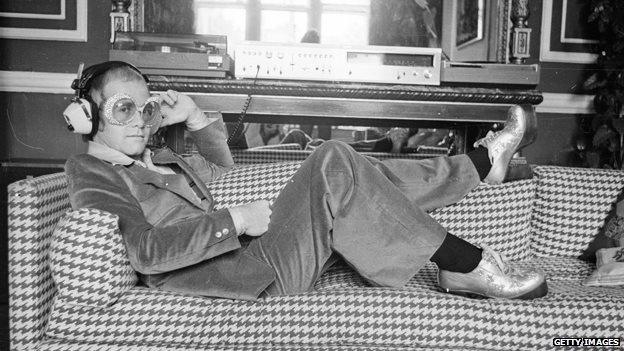
More than 30 million copies of Goodbye Yellow Brick Road have been sold since 1973
Goodbye Yellow Brick Road is Elton John's best-selling and most enduring album.
Over a two-week recording binge, it grew from a single to a double album, its 17 tracks including hits such as Bennie and the Jets and Candle In The Wind.
Its release came at an exciting period in the star's career. His previous record, Don't Shoot Me I'm Only the Piano Player, released just nine months earlier, had become his first UK number one.
His elaborate live shows were winning rave reviews in the US while, simultaneously, his musical creativity was hitting a peak.
In its 40th birthday year, the album is being re-released in a box set crammed with live performances, film footage and a disc of covers by the likes of Fall Out Boy, Ed Sheeran and John Grant.
Using a combination of new and archive interviews, here is the story of the album by the people who made it.

TONY KING: Around that time, it was obvious that Elton was becoming a bit of a star. His recordings were becoming more exciting.
DAVEY JOHNSTONE: I remember being on a train, getting Melody Maker and seeing Don't Shoot Me was number one. And it was like, "Oh, that's great. It's happening!"
ELTON JOHN: I didn't ever envisage being a star. It happened so quickly and so stupidly. Suddenly, from nowhere, I was in the same room as George Harrison. I couldn't believe it.
CALEB QUAYE: He had money to spend. His wardrobe started to become more embellished. This is what he had always wanted.
The initial sessions for Goodbye Yellow Brick Road were due to take place in Jamaica, where the Rolling Stones had recently recorded their Goats Head Soup LP.
ELTON JOHN: We land the day after the Foreman-Frasier fight, so the island is swarming. We can't get into a hotel. The band, sensible lot, they went off to the other side of the island - Ocho Rios, which is the more glamorous side. I'm stuck in Kingston in the Pink Flamingo hotel, my only contact being a room with an electric piano in it. I wouldn't go out of my room, I was so frightened.
TONY KING: The Jamaica experience wasn't great at all. They only had one microphone. There was barbed wire all around the studio. It was just a complete mess.
DAVEY JOHNSTONE: We tried to cut Saturday Night's Alright For Fighting and it really sounded hilarious. It was like the Chipmunks or something. There was no balls to it. We all started laughing, but there was no panic - we knew it would work back at the Chateau.
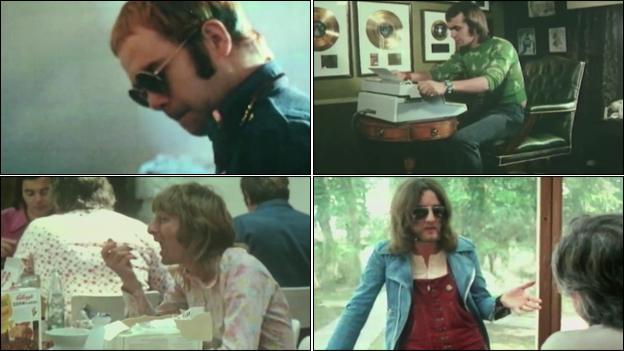
Hard at work in France (clockwise from top left): Elton John, Bernie Taupin, Gus Dudgeon (who died in 2002) and Dee Murray
The band decamped to the Chateau d'Herouville in France, where Elton's previous two albums had been made. Once in place, the writing and recording of Goodbye Yellow Brick Road took just two weeks.
ELTON JOHN: I'm not the sort of songwriter that writes all the time. I just write twice a year. If I starve myself from writing, I find I can write better.
BERNIE TAUPIN: It literally was like a mini creative factory. I would write in the mornings and, when the band were having breakfast I would come down and grab a cup of coffee and give Elton a couple of lyrics I'd been working on that morning.
ELTON JOHN: I would write at breakfast at the table. The band would join in. And by the time breakfast was over, we'd written and rehearsed two songs, and we went in the studio and recorded them. The boys did the backing vocals while I was in bed. It was the height of our powers.
DAVEY JOHNSTONE: Elton's notorious for being a very fast writer - and also a little impatient in the studio. But the band was almost telepathic. We'd each know what the other one was going to play.
ELTON JOHN: Gus Dudgeon [who died in a car crash in 2002], I'd have to say, was the fifth member of the band. The sound of the drums, the sound of the piano, the sound of everything on the record was extraordinary - that was down to him. Like the Beatles had George Martin, we had Gus.
TONY KING: Nobody makes an album in two weeks any more - and that's the pity. A lot of people spend too much time in the studio faffing about. If you go in and just play, you capture the urgency of it.
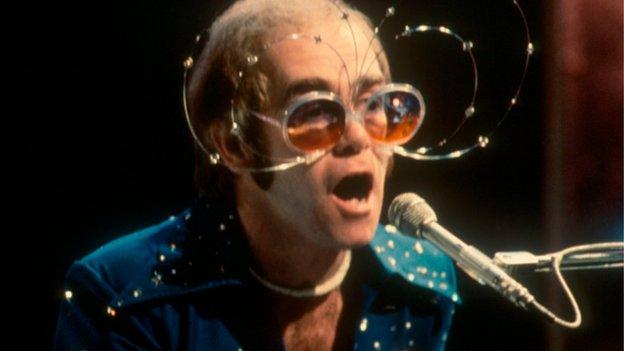
Many of the songs from Goodbye Yellow Brick Road still get played at the star's concerts today
Unusually, the record opens with a long, bravura instrumental, called Funeral For A Friend.
ELTON JOHN: Gus Dudgeon said, a long time before that, "why don't you write an instrumental?" and I never got round to it.
Then I got very down one day and said, "Hmmm - what sort of music would I like to hear at my own funeral?" It sounds very bizarre but I like funeral music anyway, I like sad music. So I decided to write something like that.
TONY KING: I just found out a very interesting thing about Funeral For A Friend. David Hentschel, who did all the synth programming, included bits of the other songs on there.
You can hear the melody of Candle In The Wind, I've Seen That Movie Too and The Ballad Of Danny Bailey. He invented that instrumental using little lines from some of the other songs. It's very clever.
PETER ASHER: Gus Dudgeon is one of the heroes in this discussion, because it's a stunningly huge-sounding record. It starts with those amazing big synths of Funeral For A Friend, and the drums sound amazing on every track. It's a hell of a record.
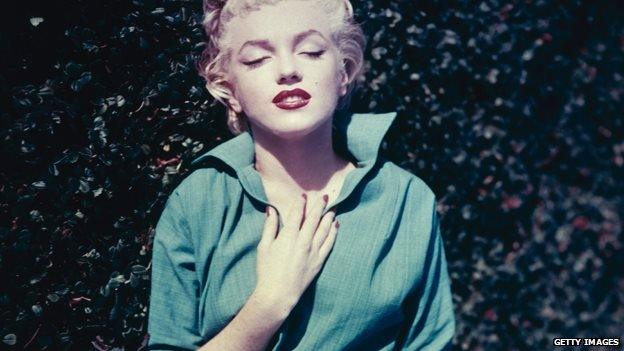
Goodbye Norma Jean: Marilyn Monroe's career was used as a metaphor for the perils of fame
DAVEY JOHNSTONE: Saturday Night had a multitude of guitars on there. We layered something like 12 guitars throughout the course of the song. And with each guitar track it sounded better and better. Elton kept saying, "Another one! Another one!"
BERNIE TAUPIN: I swear I wrote Candle In The Wind long before Norman Mailer dragged Marilyn Monroe over the coals [Mailer's controversial biography of Monroe also came out in 1973].
I'd been a Marilyn fan for a long time - ever since Madmen Across the Water, I'd wanted to write a song about her. But I'd never found the right way of doing it without being incredibly tacky.
I tried to make it a song that told you the reason she was so popular, was that she was very much somebody people could fall in love with without her being out of reach. I really don't think people thought of her as a sex symbol.
Clive Davis said of Janis Joplin that her life was like a Candle In the Wind. It was a nice phrase to use.
DAVEY JOHNSTONE: That's one of the few songs that Elton's asked me to play a riff on. And I was like, "oh that's going to suck". But being the compatible guitar player that I am, the chorus came round and I played the thing - and it worked perfectly. I was like, "you bastard."
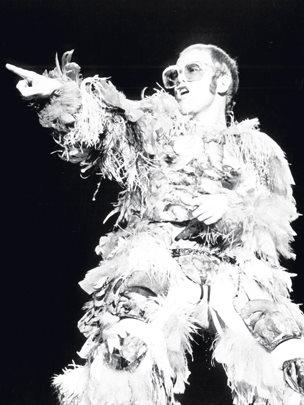
Elton's costumes became ever-more elaborate throughout the 1970s
ELTON JOHN: I remember the record company phoning up and saying Bennie and the Jets should be the single in America. And I said "no, I want Candle In The Wind".
They fought and fought and fought, and I turned them down so many times until they told me that the record had gone to number one on the R&B station in Detroit.
For me, a white boy from Pinner who'd grown up loving black music, and played the blues and R&B all my life, I just went "oh..."
So I let them have their way. It shows that, as an artist, sometimes you know nothing.
TONY KING: I went on holiday with Elton in 1973, just before the album came out. He rented a house which had once belonged to Anthony Newley and Joan Collins, and we had a fabulous month in Los Angeles.
He had installed a really top class stereo system, and so anybody who came up to the house was played the album. He was really excited about it. He really felt it was going to be something special.
ELTON JOHN: I look back on it now and I think it's a lot of young adrenalin, and you only have that adrenalin for a certain part of your career.
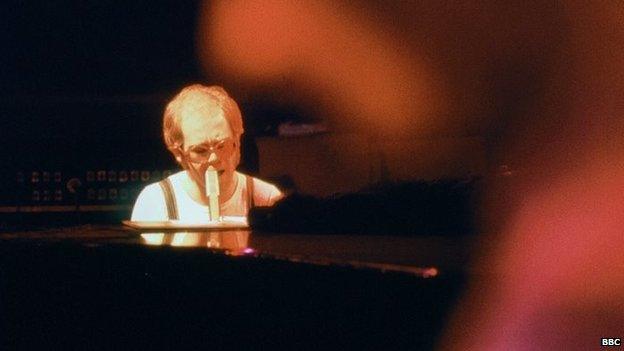
Before Goodbye Yellow Brick Road, Elton John was a bigger star in the US than at home
TONY KING: The record company wanted to put out a 40th anniversary album but we weren't too sure how to go about it. I said to Elton, "the thing is, you don't have any tracks in the vault". And so he came up with the idea of getting people to cover the album.
PETER ASHER: Of course I said "yes" [to producing the album] because it's such a brilliant opportunity to rethink these legendary songs.
TONY KING: Initially we had the idea of doing big stars, but of course all the big stars were busy doing their albums. And I'm glad for that now - because we were able to craft something that felt much more personal. It feels curated.
ED SHEERAN: If I'm honest, if I could have chosen, I'd have done any song other than Candle In The Wind. Not that it isn't a brilliant song, it's just that that song's so special to England's heart. But I think we made it less sad and more upbeat.
PETER ASHER: It struck me in a fresh way, hearing somebody else sing it - because suddenly it wasn't something you'd heard 20 million times before. It's just a beautifully-written song in every respect. It's extraordinary.
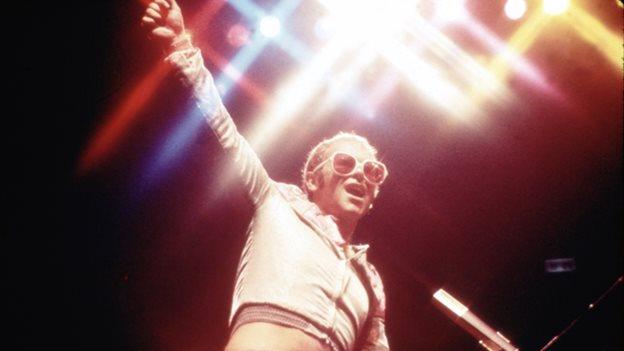
Elton followed Goodbye Yellow Brick Road with a further three UK number one records
TONY KING: Yellow Brick Road pushed Elton into a whole different category of artist. There was no-one bigger than Elton in the States at that time. It sold 31 million overall.
DAVEY JOHNSTONE: We were aware of one thing - we were riding a major wave of popularity. Especially in the States, it was just like a juggernaut. But without sounding egotistical, we weren't that surprised. We were just very happy.
ELTON JOHN: My records don't sell as much as they used to by a long way, but I'm not really interested in that any more. I don't have to chase the charts any more, I can just do what I like and that's a tremendous asset. I've been successful and I have the freedom not to care about that any more.
The anniversary edition of Goodbye Yellow Brick Road is out now. Tony King, Peter Asher and Davey Johnstone were speaking to Mark Savage. Other interviews come from the BBC's radio and television archive and Universal Music.
- Published2 September 2013
- Published7 December 2013
- Published3 November 2013